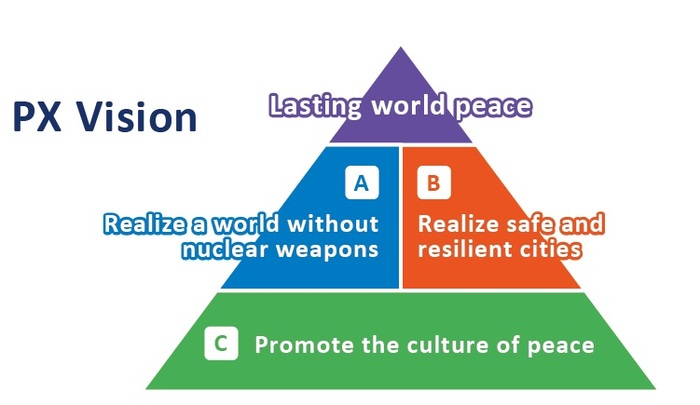7) Promotion of the Culture of Peace by Mayors for Peace
Mayors for Peace, for which the mayor of Hiroshima serves as President, is a network to promote the culture of peace in collaboration with cities around the world while sharing in the value of peace.
![]()
Mayors for Peace

In June 1982, then-Mayor of Hiroshima, Takeshi Araki, put forth a proposal during the 2nd UN Special Session on Disarmament held at the UN Headquarters in New York. His proposal was for a program that would promote solidarity between cities to work for the total abolition of nuclear weapons. This led to the establishment of Mayors for Peace, a nonpartisan organization, and it was registered as an NGO with the UN Economic and Social Council in 1991. The mayor of Hiroshima serves as its President, and there are 11 Vice Presidents worldwide, including the mayor of Nagasaki.
Mayors for Peace, which has grown into an international network of peace cities with approximately 8,500 member cities in more than 160 countries and regions around the world, is currently seeking to expand its membership to 10,000 cities. Japan has a membership ratio of 99.9% with 1,740 out of 1,741 municipalities joining the network.
In July 2021, Mayors for Peace adopted the Vision for Peaceful Transformation to a Sustainable World (PX Vision for short). In addition to two long-standing objectives, namely, “Realize a world without nuclear weapons” and “Realize safe and resilient cities,” it introduced a third objective: “Promote the culture of peace.”
Based on the PX Vision and Action Plan as a set of concrete action guidelines, Mayors for Peace, together with its member cities, their citizens, and NGOs, strives to realize lasting world peace in order to build cities where citizens act with a strong sense of solidarity.

A: Realize a world without nuclear weapons
With cities and the citizens who live in them being their targets, and catastrophic consequences on a global scale to be inflicted by their use, nuclear weapons are the greatest threat to the safety and security of citizens’ lives. We will urge global leaders to effect peace-oriented policy change by calling on the UN and national governments, especially the nuclear-armed states and their allies, to take concrete action for the total elimination of nuclear weapons.
B: Realize safe and resilient cities
In pursuit of ensuring citizens’ safety and security, we will strive to address and solve a diverse range of issues distinctive to each member’s region that are threatening the coexistence of the human race, such as starvation, poverty, the plight of refugees, human rights abuses, and environmental degradation.
C: Promote the culture of peace
We will seek both to create an environment that urges policymakers to demonstrate decisive leadership to effect peace-oriented policy changes that facilitate the abolition of nuclear weapons, and to establish a civil society in which citizens act with a strong sense of solidarity for the realization of peaceful coexistence between the whole of humanity. To that end, we will cultivate peace consciousness and cause the culture of peace―the culture in which the everyday actions of each member of the public are grounded in thinking about peace―to take root in civil society as the foundation of lasting world peace.
Related pages
- 1) The Atomic Bombing and the Spirit of Hiroshima
- 2) Becoming an International Peace Culture City
- 3) What is the Culture of Peace?
- 4) The Significance of Promoting the Culture of Peace
- 5) Promoting the Culture of Peace is the Role of Cities
- 6) The Will for Peace Based on the Realities of the Atomic Bombing
- Conclusion: Importance of Citizen-Led Initiatives
Inquiries regarding this page
Peace Promotion Division, Citizens Affairs Bureau
Phone: 81-82-504-2898/ファクス: 81-82-504-2986
Mail: [email protected]
